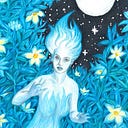One of my best friends is autistic. She was only diagnosed in her late 20s and definitely women are less likely to be diagnosed as autistic.
One question I have about the way you write about autism - if it's so broad a spectrum and can present as neurotypical, and different autistic people can have different experiences of what it is to be alive and to be autistic - to the point that two autistic people could be as widely divergent from each other as a neurotypical person and an autistic person - then how can you also say "neurotypical society others an entire neurotype" as if there IS some kind of really central experience to being autistic that all autistic people share and that is specifically what is being discriminated against?
It sounds like on the one hand you're saying autism can present in almost any form, and people can be autistic without anyone knowing - but then also somehow all autistic people are being "othered" by a neurotypical society? How can that be?
If it's so common, couldn't it be that a lot of doctors and psychiatrists themselves (the ones who contribute to the DSM for example) are themselves neurodivergent? So is it really "neurotypicals oppressing the neurodivergent" or is it maybe more complex than that?
I want to be a good ally to my neurodivergent loved ones, but I struggle with such a broad definition of autism that seems to lose meaning...
